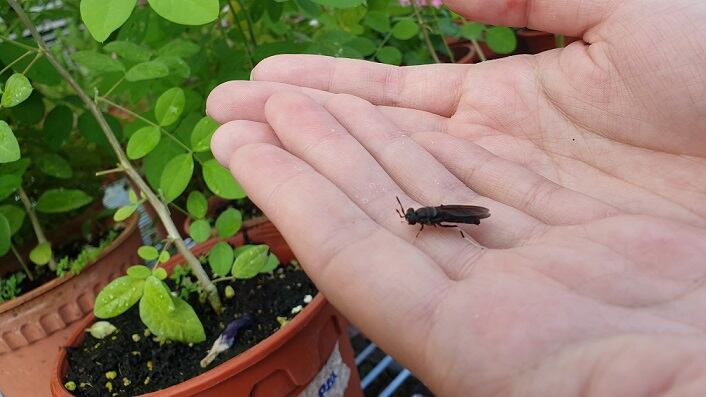The company, which claims to have the first insect farm in Singapore, raises black soldier flies that feed on food waste before being converted into viable materials such as chitosan.
It is a useful material that has many functions. For cosmetics, it has antioxidant, antimicrobial and wound-healing properties. Additionally, it can enhance penetration into skin.
Chitosan is conventionally sourced from shrimp and crab. However, the company believes using insects is cleaner and more sustainable.
“These flies are not pests, they don't bite. They are native to Singapore and not an invasive species. They feed on food waste which would otherwise go into the incinerator. We're trying to promote a circular economy,” said Chua Kai Ning, chief marketing officer of Insectta.
The flies on the farm, which are housed in a small room, can consume around 7.5 tonnes of food waste a month.
“It’s really killing many birds with one stone. It takes the food waste out of the supply chain, recycling it into a product that is high-quality and has high value,” said Chua.
Chief technology officer Phua Jun Wei told CosmeticsDesign-Asia that shrimps are typically farmed in “horrible conditions”, which can cause heavy metal accumulation in their shells.
“Some say that you’re using shrimp and crab shells is helpful because they are waste products but its not exactly true. There are chitosan manufacturers that resort to buying from factories that primarily harvest marine resources for shell. This way, you are indirectly contributing to the exploitation of marine resources,” he elaborated.
Insectta’s black soldier fly larvae feed on pre-consumer waste such as soya bean and brewery waste in order to ensure traceability.
“It’s clean because we know exactly what we are feeding them,” said Chua.
Small bug, big future
Insectta was founded in 2018 with the intention of producing animal feed but realised it was not a feasible plan in a country with limited land and resources.
“We realised that with biological and chemical processes, we can remove the indigestible components in protein meal. And those themselves in a refined form is worth a lot of money, so we decided to focus on that instead,” Phua said.
Phua clarifies that the company does not function primarily as a farm and plans to focus more on R&D.
“Our business plan is not to do the farming ourselves. We work with different farms to process the biomass in a way that we want, so we can get the chitin and we bring it to contract manufacturers that use our IP and turn it into chitosan,” he said.
The firm has yet to start large scale production of the chitosan but is currently in the midst of its first industrial trial.
It is also currently working on a new biological method to convert chitin into chitosan.
“We are aiming to be truly sustainable. To convert it, it usually uses 50% sodium hydroxide. That's very caustic and not environmentally friendly. We are working on a biological method to remove the use of 50% sodium hydroxide. This will create a much better chitosan product,” said Phua.
Moving forward, Chua said the focus will be on the cosmetics and pharmaceutical industries which show the most potential for chitosan.
“We are looking for partners that can collaborate with us not just in terms of the commercial aspect but also R&D. We are also looking to get more funding to help us bring the product from the lab to market.”



